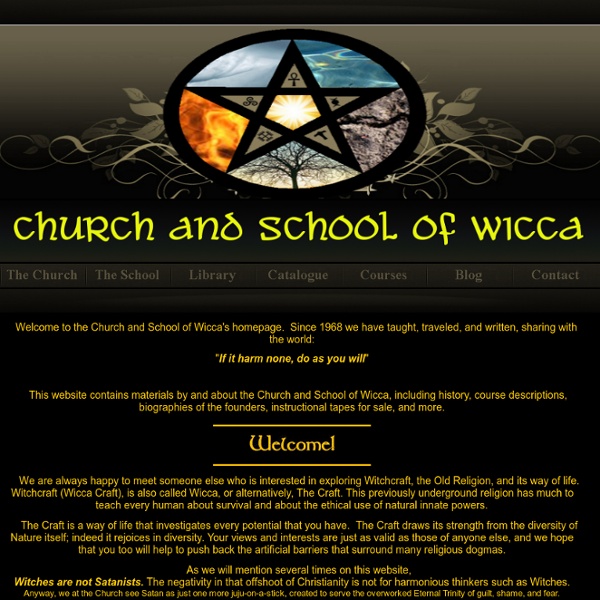



Religions - Zoroastrian: The Parsis What are the different types of pagan Paganism is an umbrella term that is used to describe people who do not follow Christianity or Islam. It can include Wiccans, Buddhists, Druids, and Eclectic Witches in its description - to name but a small few. The basic principles of Paganism are as follows: Pagans revere the Earth. Pagans are typically deeply concerned about the environment. Most Pagans engage in celebrations of the changing seasons, and see time in cyclical rather than linear terms. Pagans tend to be fiercely individual, but tolerant of the belief systems of others. The Divine has made Itself manifest through many Deities in different places and at different times. Pagans believe in balance between the Masculine and Feminine energies of the universe. Many pagans believe in Karma, and the Law of Return. It is no more true that all Pagans are Wiccans than it is true that all Christians are Methodists.
WitchSchool Temurah (Kabbalah) Temurah is one of the three ancient methods used by Kabbalists to rearrange words and sentences in the Bible, in the belief that by this method they can derive the esoteric substratum and deeper spiritual meaning of the words. (The others are Gematria and Notarikon.) Temurah may be used to change letters in certain words to create a new meaning for a Biblical statement. There are three simple forms of Temurah: Atbash: Replacing the first letter with the last letter of the Hebrew alphabet, the second with the next-to-last, and so on. a=z, b=y, c=x, etc. Avgad: Replacing each letter with the preceding letter. a=b, b=c, c=d Albam: Replacing the first letter of the alphabet with the twelfth, the second with the thirteenth, and so on. a=l, b=m, c=n, etc.
Occult Forum.org Forums Basics of Buddhism The Four Noble Truths The Four Noble Truths comprise the essence of Buddha's teachings, though they leave much left unexplained. They are the truth of suffering, the truth of the cause of suffering, the truth of the end of suffering, and the truth of the path that leads to the end of suffering. The Four Noble Truths are a contingency plan for dealing with the suffering humanity faces -- suffering of a physical kind, or of a mental nature. The Third Noble Truth, the truth of the end of suffering, has dual meaning, suggesting either the end of suffering in this life, on earth, or in the spiritual life, through achieving Nirvana.
What is Wicca? What is Wicca? Wicca. Witchcraft. The Path. The Craft. Whatever you call it, it's more than just a religion or magick, it's a way of life -- in perfect love and perfect trust. The philosophy of the religion (acknowledged as such by the U.S. As Starhawk said in "Spiral Dance ": Our practice arises from a deep, spiritual commitment to the earth, to healing and to linking of magick to political action. Each one of us embodies the divine. Honoring both Goddess and God, we work with female and male images of divinity, always remembering that their essence is a mystery that goes beyond form. In honoring the Goddess and God, we acknowledge the duality that exists in all facets of life. Wicca is an Earth religion -- an accepting, open-minded faith that celebrates diversity and considers us all to be children of the same mother. Next Page Glossary For further reading Get a Rune or Tarot reading, dream interpretation or astrological report
The Grey School of Wizardry :: Thank you for your interest in attending our Grey School of Wizardry! We look forward to your acceptance and participation in our school! Please bear in mind that we originally designed this School for students in the 11-18 age range. The reading level and general difficulty of classes are therefore intended for such younger students, beginning with the most basic aspects of Wizardry and moving up to more complex topics, as most students progress through seven levels. However, due to considerable interest from adults, we have chosen to make our classes also available to students older than 18. There are currently two different ways to pay tuition at Grey School. The GSW Magister program is designed to allow adult students to take an unlimited number of classes at the Grey School of Wizardry from all levels without the constraints of the structured Apprenticeship program. There are no Level-Up fees associated with the Magister program. Let's begin!